Modèles opérationnels
Le rapport « La situation mondiale des transferts monétaires » du CALP Network identifie plusieurs types de modèles opérationnels, dont les consortiums et les alliances, les mécanismes de distribution des transferts partagés, un modèle de distribution des transferts monétaires articulé autour d’une seule organisation et l’intégration de systèmes.
« La structure générale au sein de laquelle les organisations travaillent conjointement […] pour distribuer les transferts monétaires […] lors d’interventions et d’activités d’analyse, et de la conception et de la mise en œuvre de programmes. »
Notre définition d’un modèle opérationel
Accroître l’échelle des transferts monétaires permet de transformer la manière dont l’aide humanitaire est distribuée. Cette décision a des conséquences sur les rôles des organisations dans le cadre de plusieurs modèles opérationnels, et sur la capacité des modèles à établir un lien avec les systèmes de protection sociale. Un changement d’échelle aura également un impact sur les partenariats avec des fournisseurs de technologies et de services financiers et sur la manière dont différents modèles interagissent avec d’autres formes d’assistance.
Priorités actuelles
Depuis fin 2016, le CALP Network assure la coordination d’un programme d’apprentissage visant à répondre aux questions suivantes :
- Quels sont les modèles opérationnels disponibles pour les organisations mettant en œuvre les transferts monétaires ?
- Comment différents modèles ont-ils amélioré l’efficience, l’efficacité et la transparence des transferts monétaires dans divers contextes ?
- Quels sont les modèles opérationnels les plus appropriés dans chaque contexte ?
Nous continuerons de compiler et diffuser notre base de données probantes sur les modèles opérationnels.
Nous sommes également partenaire du consortium Cash Monitoring, Evaluation, Accountability, and Learning Organizational Network (CAMEALEON), piloté par le Conseil norvégien pour les réfugié·es, qui est responsable du suivi et de l’évaluation indépendantes du programme d’assistance monétaire à usages multiples du PAM au Liban. À ce titre, nous menons des recherches et des analyses concernant l’optimisation des ressources et la redevabilité au sein du modèle opérationnel.
Contenu présenté

Operational Models: Accountability to affected people
Webinar

MEAL in Emerging Operational Models
Webinar

CTP Operational Models Analytical Framework
Guidelines and Tools
The State of the World’s Cash Report launched by the CALP Network in February 2018 highlights trends in the uptake of various operational models for the delivery of cash at scale in humanitarian response. Current decision making on the choice between these various operational models is highly influenced by context, and by the policies and approaches of donor agencies. Decision making on...
Thematic lead
Contenu récent

Cash Emergency Preparedness (CEP) Pilots
Guidelines and Tools
CEP guidelines and Key findings from pilot assessments

Impact Evaluation of Cash, Food Vouchers, and Food Transfers among Colombian Refugees and Poor Ecuadorians in Carchi and Sucumbíos
Report
This report is the final impact evaluation of the World Food Programme’s Food, Cash, and Voucher intervention and contains analysis on outcomes including food security, social capital, anemia, and gender issues. Due to the targeting of Colombian refuges and poor Ecuadorians in Northern Ecuador, it also...
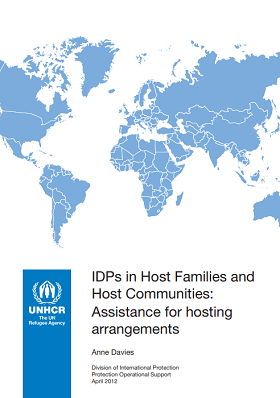
IDPs in Host Families and Host Communities: Assistance for Hosting Arrangements
Report
The phenomenon of internally displaced persons (IDPs) and refugees residing with host families is still relatively unexplored in comparison to what is known about IDPs and refugees living in camps. Of the nearly 14.7 million IDPs protected and assisted by UNHCR in 2010, an estimated 52% of the total live...

Examining Differences in the Effectiveness and Impacts of Vouchers and Unconditional Cash Transfers
Report
The objective of this study is to examine the differences in the effectiveness and impacts of vouchers versus unconditional cash transfers in the Bushani camp of the Masisi territory of the Democratic Republic of Congo. As part of this research, the study team collected household data from over...
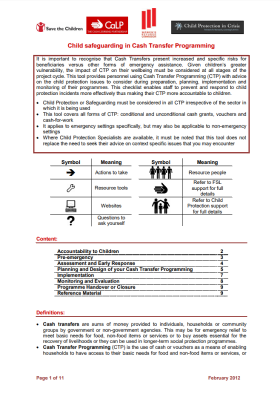
Child Safeguarding in Cash Transfer Programming Tool
Guidelines and Tools
It is important to recognise that Cash Transfers present increased and specific risks for beneficiaries versus other forms of emergency assistance. Given children’s greater vulnerability, the impact of CTP on their wellbeing must be considered at all stages of the project cycle. This tool provides...
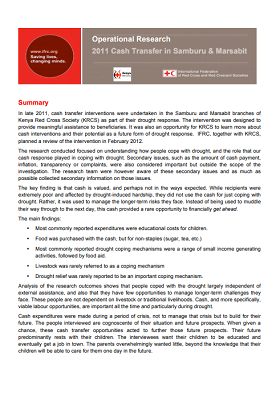
Operational Research: 2011 Cash Transfer in Samburu & Marsabit
Report
In late 2011, cash transfer interventions were undertaken in the Samburu and Marsabit branches of Kenya Red Cross Society (KRCS) as part of their drought response. The intervention was designed to provide meaningful assistance to beneficiaries. It was also an opportunity for KRCS to learn more about cash...
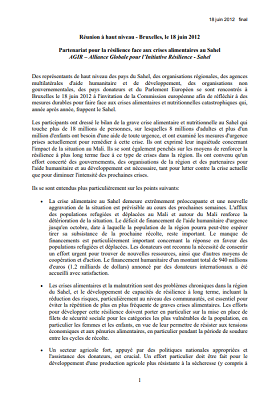
Partenariat pour la résilience face aux crises alimentaires au Sahel
Rapport
Des représentants de haut niveau des pays du Sahel, des organisations régionales, des agences multilatérales d’aide humanitaire et de développement, des organisations non gouvernementales, des pays donateurs et du Parlement Européen se sont rencontrés à Bruxelles le 18 juin 2012 à...

Child Safeguarding in Cash Transfer Programming
Guidelines and Tools
While cash transfers have become a key intervention in emergencies, they also pose increased and additional risks for beneficiaries, compared with other forms of assistance. Children are particularly vulnerable, and even more so in emergencies. The impact of cash transfer programming on children’s...

Market Information and Food Insecurity Response Analysis (MIFIRA) Framework Course
Guidelines and Tools
Access Course Here This course outlines the rationale for “response analysis” and introduces a field-tested, systematic approach to this emergent activity. The Market Information and Food Insecurity Response Analysis (MIFIRA) framework provides a logically sequenced set of questions that help...

Cash Transfers in Nairobi’s Slums
Report
In Kenya, a combination of factors led to the food crisis of 2008–9, which put around 9.5 million people at risk of starvation. About 4.1 million of those affected were living in informal settlements (slums) in the capital, Nairobi. Oxfam and Concern Worldwide developed a joint programme to address...

Emergency Food Security and Livelihoods (EFSL) 48-hour Facilitator’s Materials
Guidelines and Tools
Developed by Oxfam and supporting ECB agencies, the EFSL training materials can be used to train participants to confidently apply the ‘48-hour assessment tool’ to assess the impact of a shock/hazard on an affected population’s food security and livelihoods. The Facilitator Materials include session...
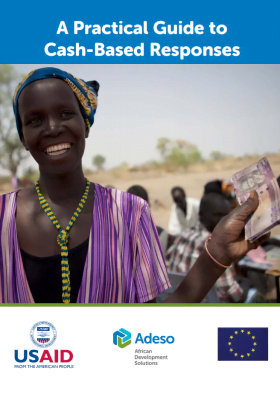
A Practical Guide to Cash-Based Response
Guidelines and Tools
A Practical Guide to Cash-based Responses is a manual developed by Adeso to share the organisation’s experience in developing and implementing appropriate cash-based responses. The manual highlights some practical problems that are faced by implementation teams around the world and it is intended to...
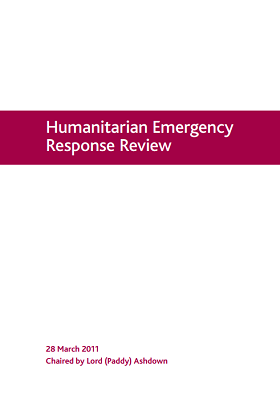
Humanitarian Emergency Response Review
Report
This independent review into how the UK (through DFID) responds to humanitarian emergencies, considers how the UK should best respond to overseas emergencies and the role the UK should play in the international humanitarian system. It looks at the potential future humanitarian challenges and the...
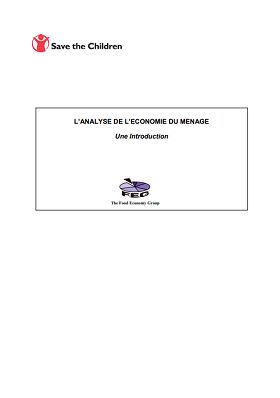
L’analyse De L’economie Du Menage: Une Introduction
Rapport
Cette methodologie a été conçue pour répondre à des questions spécifiques sur la sécurité alimentaire et sur les moyens d’existence, d’une façon fiable et rapide. Elle se concentre sur les moyens d’existence dans differents environnements et sur les opérations economiques des ménages....

Oxfam Programme Quality Standards: Cash transfer programmes (CTPs)
Guidelines and Tools
Through its Emergency Food Security and Vulnerable Livelihoods (EFSVL) work, Oxfam aims to meet immediate food needs and protect livelihoods, whilst contributing to the longer term economic recovery of disaster affected populations and increasing their resilience to future shocks. Oxfam believes that...
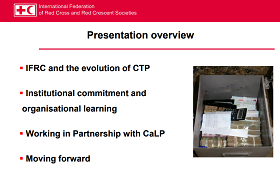
IFRC and the evolution of CTP
Presentation
An IFRC presentation covering the following topics: IFRC and the evolution of CTP Institutional commitment and organisational learning Working in Partnership with the CALP Network Moving forward
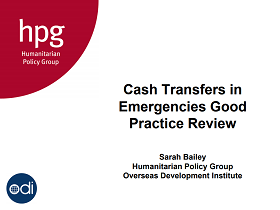
Cash Transfers in Emergencies Good Practice Review: Presentation
Presentation
Powerpoint presentation on the then-forthcoming Good Practice Review on cash transfer programming in emergencies.
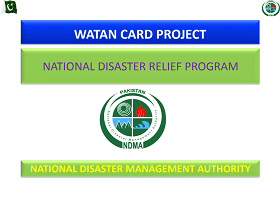
Watan Card Project – Pakistan National Disaster Relief Program
Presentation
Presentation to the CALP Network 4th Global Learning Event (Bangkok, February 2011) from the National Disaster Management Authority of the Government of Pakistan. The presentation reviews the WATAN card cash transfer programme implemented by the Government to transfer money to flood affected people. The...
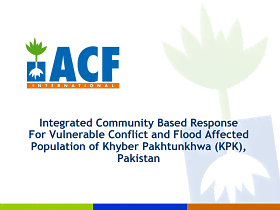
Integrated Community Based Response for Vulnerable Conflict and Flood Affected Population of Khyber Pakhtunkhwa (KPK), Pakistan
Presentation
A presentation discussing objectives, modalities, target beneficiaries and best practices of integrated community-based response for vulnerable conflict and flood-affected population of Khyber Pakhtunkhwa (KPK), Pakistan.
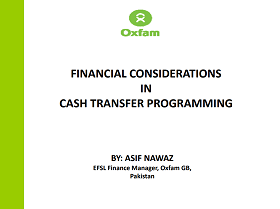
Financial Considerations in Cash Transfer Programming
Presentation
OBJECTIVES OF THE PRESENTATION • Finance considerations and challenges in CTP • Delivery Mechanisms used in the Flood Response. • Oxfam’s Experience with Order Cheques – Challenges and Innovation. • Delivery Mechanism’s – the selection dilemma.



